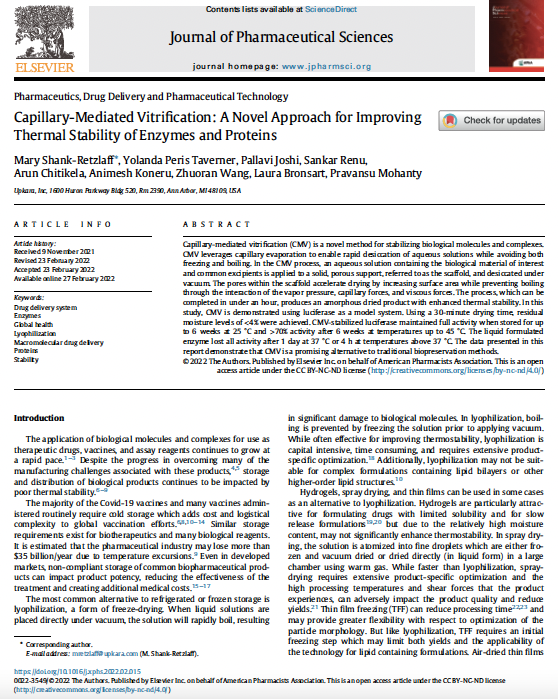INSIGHTS
Our latest thinking on the issues that matter most in biopreservation science and techonology. Explore our featured insights.
GENETIC ENGINEERING & BIOTECHNOLOGY NEWS
March 2024
Kick Cold-Chain Dependency: The Future of Antibody Storage Is Here
Current biomolecule storage methods rely on decades-old technologies, but today’s scientists need innovative solutions for state-of-the-art molecules and conjugates. BioFix™ delivers ambient temperature-stable products that make science easier for you and your customers. This manufacturing-ready technology provides convenience, profitability and sustainability.
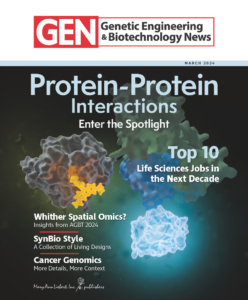
BIOMATTERS
Spring 2023
Unchaining Innovation to Advance Health Equity
Imagine waiting for a lifesaving medication or vaccine only for it to arrive damaged after sitting in a hot shipping container for too long. Picture years of research and hard-earned grant funding being wasted because materials spoiled due to a delay on the tarmac. Though it isn’t always obvious, billions of people worldwide are affected by the inefficiencies of cold chain logistics.
Each year, the pharmaceutical industry alone spends approximately $18.6 billion on cold chain support to store and transport temperature-sensitive products. Losses related to cold chain failures add up to an additional $35 billion annually. Such costs are also challenging for universities, researchers, and reagent manufacturers.
But what if it was possible to stabilize fragile biomolecules without the use of freezing? Thanks to cutting-edge technology, it is.
Upkara is a diverse, forward-thinking biotechnology company headquartered in Ann Arbor, Michigan. It was founded by Pravansu Mohanty, Ph.D., as a spin-off of the Somnio think tank whose mission was to address global unmet needs. Upkara’s focus is biomolecule stabilization. Their novel technology, unlike the current stabilization technique of lyophilization or freeze drying, is rapid, cost-effective, and broadly applicable.
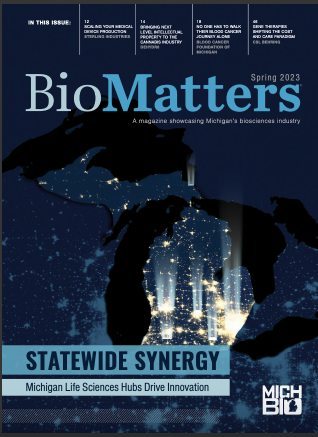
AMERICAN CHEMICAL SOCIETY
August 2022
Capillary-Mediated Vitrification: A Novel Approach for Preparing Thermostable, Ready-to-Use Reagents
Currently, biological reagents require temperature-controlled storage and distribution, which is both energy and resource intensive. Additionally, reagents are supplied at high concentrations and volumes resulting in significant material discard and complicated dilution schemes. We have developed a bio-preservation method, capillary-mediated vitrification (CMV), that enables storage of reagents at ambient temperatures and at concentrations designed to match the assay requirements. In this report, we demonstrate the stability and performance of CMV-stabilized reagents. CMV is a promising alternative to traditional biopreservation methods that significantly improves analytical workflow efficiencies and eliminates the need for cold storage.
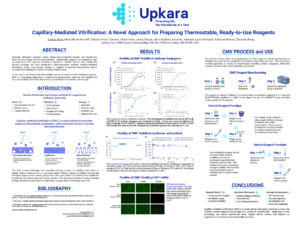
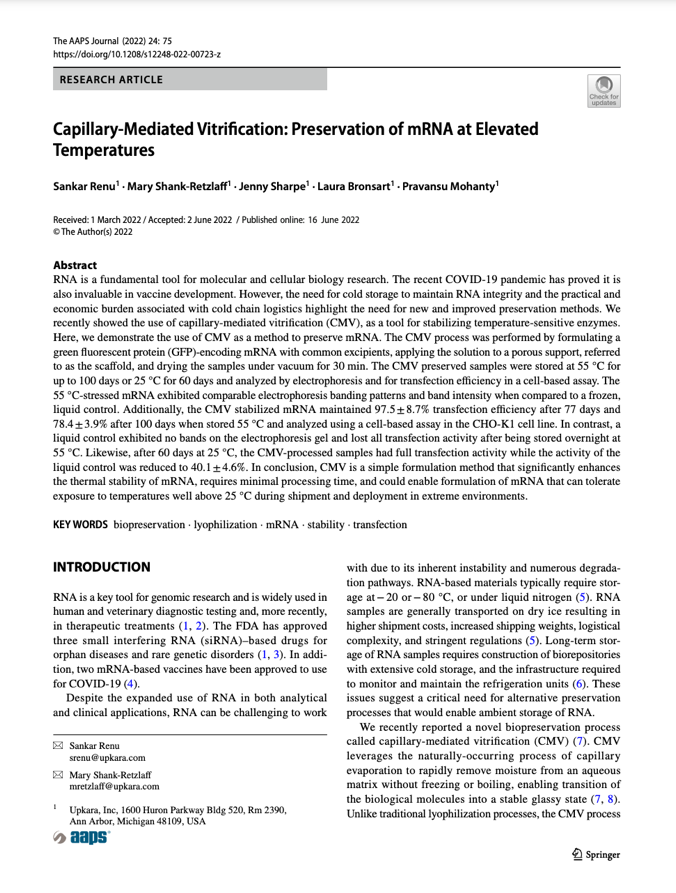
THE AAPS JOURNAL
June 2022
Capillary-Mediated Vitrification: Preservation of mRNA at Elevated Temperatures
RNA is a fundamental tool for molecular and cellular biology research. The recent COVID-19 pandemic has proved it is also invaluable in vaccine development. However, the need for cold storage to maintain RNA integrity and the practical and economic burden associated with cold chain logistics highlight the need for new and improved preservation methods. We recently showed the use of capillary-mediated vitrification (CMV), as a tool for stabilizing temperature-sensitive enzymes. Here, we demonstrate the use of CMV as a method to preserve mRNA. The CMV process was performed by formulating a green fluorescent protein (GFP)-encoding mRNA with common excipients, applying the solution to a porous support, referred to as the scaffold, and drying the samples under vacuum for 30 min. The CMV preserved samples were stored at 55 °C for up to 100 days or 25 °C for 60 days and analyzed by electrophoresis and for transfection efficiency in a cell-based assay. The 55 °C-stressed mRNA exhibited comparable electrophoresis banding patterns and band intensity when compared to a frozen, liquid control. Additionally, the CMV stabilized mRNA maintained 97.5 ± 8.7% transfection efficiency after 77 days and 78.4 ± 3.9% after 100 days when stored 55 °C and analyzed using a cell-based assay in the CHO-K1 cell line. In contrast, a liquid control exhibited no bands on the electrophoresis gel and lost all transfection activity after being stored overnight at 55 °C. Likewise, after 60 days at 25 °C, the CMV-processed samples had full transfection activity while the activity of the liquid control was reduced to 40.1 ± 4.6%. In conclusion, CMV is a simple formulation method that significantly enhances the thermal stability of mRNA, requires minimal processing time, and could enable formulation of mRNA that can tolerate exposure to temperatures well above 25 °C during shipment and deployment in extreme environments.
JOURNAL OF PHARMACEUTICAL SCIENCES
February 2022
Capillary-Mediated Vitrification: A Novel Approach for Improving Thermal Stability of Enzymes and Proteins
Capillary-mediated vitrification (CMV) is a novel method for stabilizing biological molecules and complexes. CMV leverages capillary evaporation to enable rapid desiccation of aqueous solutions while avoiding both freezing and boiling. In the CMV process, an aqueous solution containing the biological material of interest and common excipients is applied to a solid, porous support, referred to as the scaffold, and desiccated under vacuum. The pores within the scaffold accelerate drying by increasing surface area while preventing boiling through the interaction of the vapor pressure, capillary forces, and viscous forces. The process, which can be completed in under an hour, produces an amorphous dried product with enhanced thermal stability. In this study, CMV is demonstrated using luciferase as a model system. Using a 30-minute drying time, residual moisture levels of <4% were achieved. CMV-stabilized luciferase maintained full activity when stored for up to 6 weeks at 25 °C and >70% activity after 6 weeks at temperatures up to 45 °C. The liquid formulated enzyme lost all activity after 1 day at 37 °C or 4 h at temperatures above 37 °C. The data presented in this report demonstrate that CMV is a promising alternative to traditional biopreservation methods.
